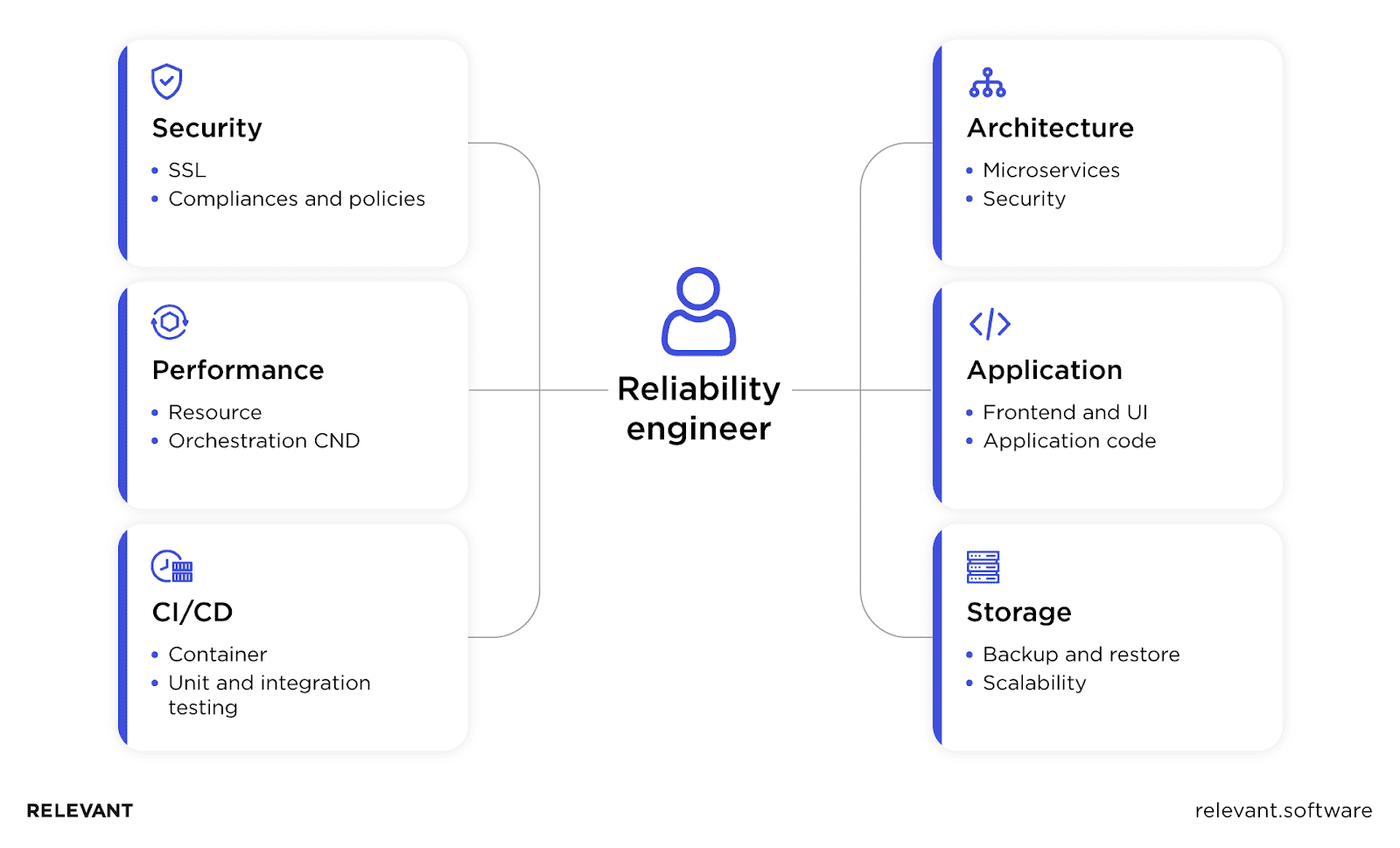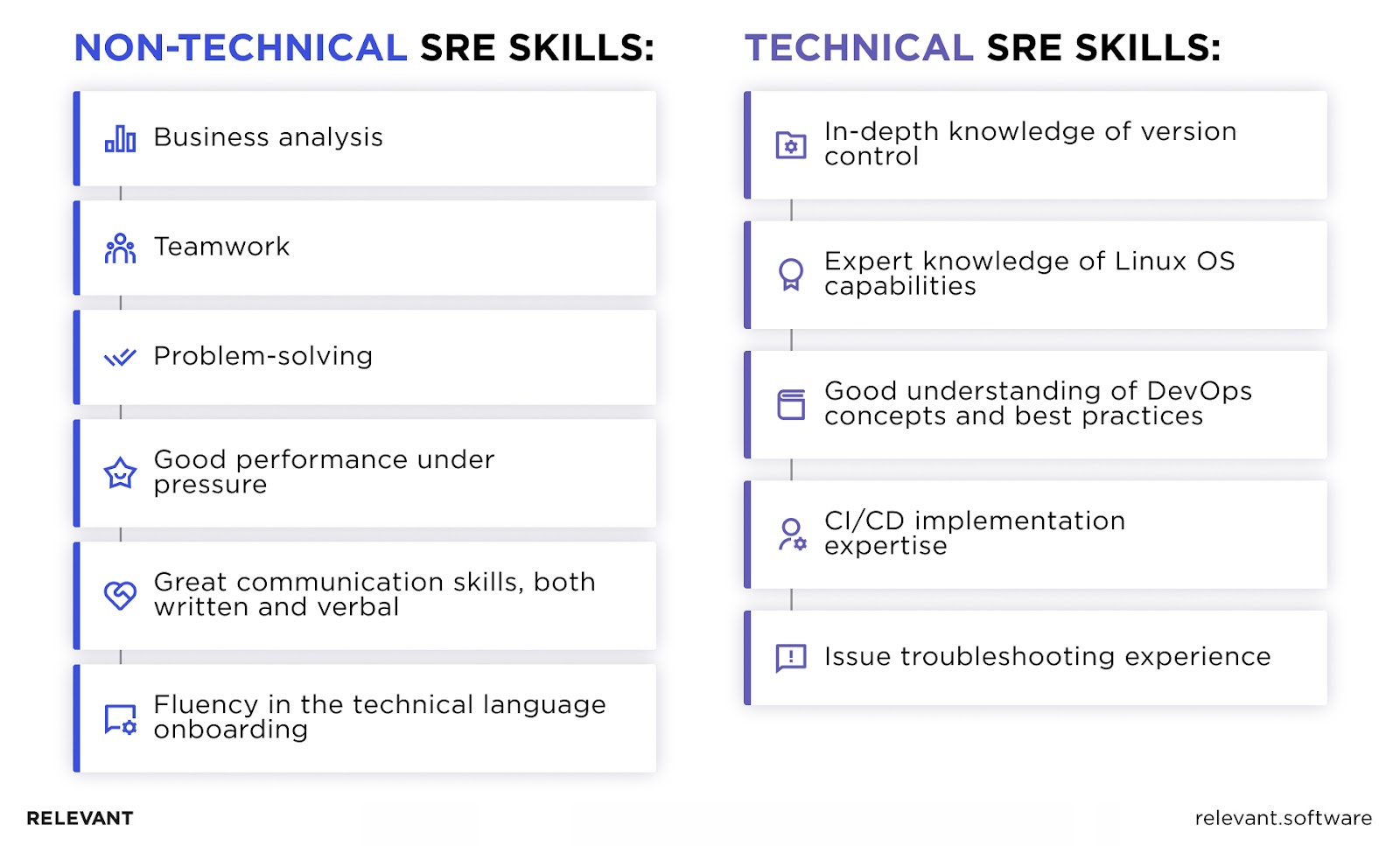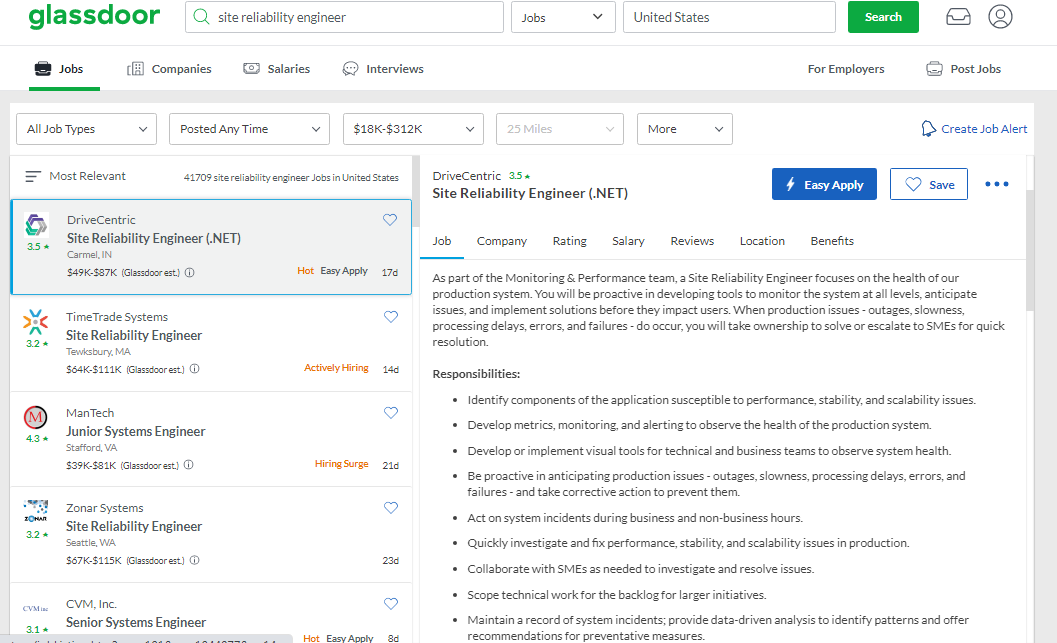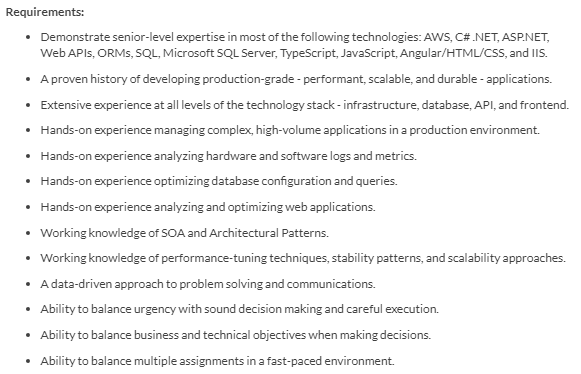Why and How to Hire a Site Reliability Engineer (SRE) in 2023 [Salary and Job Requirements Included]
![Why and How to Hire a Site Reliability Engineer (SRE) in 2023 [Salary and Job Requirements Included]](/media-webp/SRE-engineer.png.webp)
In today’s digital age, businesses of all sizes rely on technology to operate and deliver services to their customers. As a result, it’s crucial for organizations to have systems in place that are stable, reliable, and able to handle the demands of their users. That’s where a Site Reliability Engineer (SRE) comes in.
An SRE is a tech-savvy professional who works to ensure that your systems are stable, reliable, and able to handle the demands of your users. They proactively monitor and maintain your infrastructure, troubleshoot problems as they arise, and work to prevent future issues from occurring. In short, an SRE is the superhero of your online operations.
from 25 countries outsourced software development to Relevant
We provide companies with senior tech talent and product development expertise to build world-class software.
After reading this article, you will have a clear understanding of:
- whether you really need to hire an SRE expert;
- what skills a qualified Site Reliability Engineer must have;
- how to write an SRE job description;
- what questions should you ask when interviewing a Site Reliability Engineer;
- what is the best way to hire a Site Reliability Engineer.
Please note that the salaries and hourly rates mentioned in this article don’t equal the cost of hiring offshore software developers through outsourcing companies.
What is a Site Reliability Engineer?

A Site Reliability Engineer is a person who works to ensure that the systems and infrastructure of a company or organization are running smoothly and that they can handle any unexpected problems that might arise. They work to prevent outages and downtime, and when problems do occur, they are the ones who fix them as quickly as possible.
The SRE role is becoming increasingly important as businesses move more and more of their operations online. With so many services being delivered over the internet, it’s crucial that companies know how to keep their websites and other online properties running smoothly at all times.
A Site Reliability Engineer (SRE) is a team member directly responsible for this task since they specialize in designing and maintaining the infrastructure that powers your business’s websites. SREs work with your team to build out tools and processes that will support your website’s growth, ensuring its reliability and accessibility.
SRE vs. DevOps: What’s The Difference?
An SRE developer should not be mixed up with DevOps engineers, although many sources use these two terms interchangeably.
DevOps is a process of automating all the repetitive IT operations to minimize human effort (and the risk of human error) while running your infrastructure. DevOps engineers focus on software development, deployment, and operating production environments.
SRE, on the other hand, is a paradigm of continuous analysis of the existing infrastructure from the reliability perspective, focused on removing performance bottlenecks and optimizing the infrastructure, toolkit, and workflows associated with its operation. Born in Google, SRE is now the leading approach to ensuring long-term sustainability and operational resilience of digital assets.
SRE job responsibilities
While Ops engineers have to run an infrastructure they’re given and put out fires all over it, and DevOps can automate various aspects of IT operations to reduce the number of incidents, SREs have to plan and design resilient infrastructure and workflows (and update them as needed).
The main SRE responsibilities are:
- Gathering project requirements from stakeholders along with a Business Analyst (BA) and Project Manager (PM)
- Designing high-level schematics of the necessary infrastructure, tools, and processes
- Performing an in-depth analysis of the possible risks and developing risk mitigation strategies
- Calculating the potential cost of outages and planning for contingency
- Monitoring the systems in production, analyzing their performance
- Preparing input for infrastructure/tooling/workflow updates across the organization.
- Training the Dev and Ops (or DevOps) teams to follow the guidelines and procedures to minimize the number of errors and incidents.
This list can go on and depends significantly on the specifics of your organization. Naturally, the SRE tasks and approaches of a global organization running legacy mainframe systems will differ from the SRE tasks of an actively growing cloud-based app.
How SRE specialists work
SRE tasks can be grouped into three major phases: design, implementation, and maintenance.
An SRE expert should be involved in all stages of any IT-related project of your organization. This includes discussing the concept of the next project, designing the infrastructure, toolset, and processes needed to deliver it, overseeing its implementation, monitoring the performance of a working system, and adjusting it if necessary. It also involves training your staff to follow the guidelines and procedures that minimize the daily toil for your IT department.
An SRE’s job never ends; it’s a permanent effort aimed at improving your IT operations and training your developers and Ops engineers on SRE best practices. This complex and multi-faceted approach requires having a set of deeply-technical skills.
Key Site Reliability Engineering Skills
The core part of SRE roles and responsibilities revolves around monitoring and analyzing the performance of your systems in production. Obviously, the particular set of tools SRE specialists have to use will differ depending on the product or service your organization provides and the way it is developed, released, and run.
However, there are crucial technical and soft skills every Site Reliability Engineer should have.

Non-technical SRE skills include:
- Business analysis
- Teamwork
- Problem-solving
- Good performance under pressure
- Great communication skills, both written and verbal
- Fluency in the technical language since SRE experts should be able to pitch their ideas to project stakeholders to secure their funding for the project or update.
Fundamental technical Site Reliability Engineer skills:
- In-depth knowledge of version control
- Expert knowledge of Linux OS capabilities
- Good understanding of DevOps concepts and best practices
- CI/CD implementation expertise
- Issue troubleshooting experience.
Common tools used by SREs
The tools SRE engineers use are highly-specific. Let’s take a brief look at the most common ones.
- Datadog. Datadog is a tool used by SREs to monitor the performance and availability of their applications. Datadog allows them to view live metrics and real-time statistics about the application, as well as historical data that can help SRE engineers identify trends in their system.
- Kibana. Kibana is a data visualization and analysis tool. It can connect to a variety of data sources, including Elasticsearch. Kibana provides a way to visualize the data in an intuitive way, so SRE engineers can quickly get an overview of what’s happening in their system.
- New Relic. New Relic is a tool that SREs can use to understand how code is used in production. It collects data from live applications so that they can understand what the application is spending time on, how much memory it’s using, and how many requests are made per second. New Relic helps SREs take a deeper look into their app’s performance so that the engineers can improve it.
- PagerDuty. Pager duty is a tool used by SREs to monitor the status of their systems. It has a robust interface that allows them to see the status of all their services and receive notifications if the system is down.
- VictorOps. VictorOps is a tool that allows SREs to monitor the health of their systems and applications. It also provides collaboration tools for teams, including chat rooms, ticketing systems, and dashboards.
- Terraform. Terraform is a tool that allows SRE engineers to manage their infrastructure as code. This is a great way to automate the provisioning of resources and then ensure that they are always configured according to best practices. Terraform can be used on its own or in conjunction with other tools, like Puppet or Ansible.
- Ansible. Ansible is a popular automation tool that allows you to automate system administration tasks. It works by running scripts on remote machines and checking the output, so it can be used for many different types of operations, from installing software to configuring systems.
Do I really need to hire an SRE?
Just like with the cybersecurity of your web or mobile apps, the importance of an SRE might not seem obvious when everything works just fine. But hiring an SRE specialist becomes a top priority when something goes wrong, and here are the four most common reasons to hire an SRE engineer:
- Minimize or prevent downtimes of your products and services. It’s 2023; customers are used to their apps working seamlessly 24/7. Prolonged downtime of your software can lead to huge financial and reputational losses.
- Evaluate risks and mitigate them. A DDoS attack or a cybersecurity breach can be devastating for any business, so you should plan for contingency and have risk mitigation strategies in place. The same goes for all other aspects of your IT operations.
- Shorten development cycles. By automating software delivery and establishing CI/CD best practices, Site Reliability Engineers can reduce the development overhead and help deliver your products faster and in a more predictable way.
- Optimize the cost and grow the revenue. SRE engineers can help you use the resources available in the smartest way possible while meeting all your customer demands during peak times. Together with a significantly reduced risk of downtime, SRE practices become revenue drivers for your business.
While you might not be Amazon, who lost $100 during an hour of an outage, every organization with customer-facing online systems can calculate the costs of their outages — and these would be enormous. Thus, hiring an SRE is a vital step for future-proofing your business and ensuring its long-term resilience. But this might not be as easy as hiring another Python engineer or other specialists whose skills aren’t so specific
Is it hard to find an SRE?
Naturally, the SRE talent market is very competitive, as global corporations are ready to pay six-digit salaries to avoid multi-million losses. Additionally, while every DevOps engineer can evolve into an SRE specialist with enough time and experience, the really talented SRE experts are in short supply — and most are employed either by industry leaders or Managed Services Providers (MSPs).
Why so? Because boredom is a gruesome enemy. When an SRE expert has to cover all the needs of an organization (or establish an in-house SRE team and train it), the scope of the challenge is big and keeps them motivated. However, once the main pain points are dealt with, ongoing monitoring (while definitely needed) requires much less time and effort, and the level of SRE engagement inevitably decreases.
The solution is either working for huge companies, where SRE is an endless journey of transforming extensive infrastructure and workflow, or working for a Managed Services Provider that has multiple clients on various stages of SRE implementation. This way, the SRE talent faces a constant influx of challenges and remains motivated to overcome them, gain experience, and grow as a professional. Besides, MSP customers pay for SRE expertise only while they need it and gain an immediate return on their investments by optimizing their IT operations and workflows.
Thus said, partnering with MSPs like Relevant Software is a win-win decision for all, allowing SRE talents to have a variety of projects and startups. Companies, in turn, can gain access to SRE expertise they wouldn’t be able to hire otherwise.
Your next read: Principal Software Engineer
Hiring SRE Experts: In-house vs. Outsourcing
When it comes to hiring SRE experts, there are two options: in-house and outsourcing. But which is best?
In-house experts can be great for your company if you have the resources and ability to hire, train, and retain them. Hiring in-house is great for staying in the closest possible touch and keeping careful track of your project progress. However, all these benefits come with related costs—you’ll have to pay SRE engineers salaries (which are pretty high in the US), plus the cost of any benefits packages you offer.
If you don’t want the hassle of managing your own team, outsourcing can be a smart option. You’ll need to find a reputable vendor, but once that’s done, you’ll be paying only for the service itself.
The choice between in-house and outsourcing largely depends on your organization’s goals as well as its existing resources and capacity. However, keep in mind that because of the specific expertise of SRE engineers hiring for an SRE position locally can be challenging. In this case, outsourcing becomes a smarter, and sometimes the only option to strengthen your team with this specialist.
We provided custom development services to more than 200 companies worldwide, building dedicated teams of software programmers, Site Reliability Engineers, and DevOps specialists. You are also welcome to consider our IT outsourcing services company if your business needs top-notch programming talent and strong technical support.
Site Reliability Engineer salary expectations
Based on Glassdoor, Statista, and other credible open data sources, here are the salary ranges for a Software Reliability Engineer.
- The average SRE salary worldwide is around $96k per year
- The average salary of an SRE in the US is around $126k per year
- The average salary of an SRE in the EU is around $73k per year
- The average salary of an SRE in Eastern Europe is from $48k to $60k
You might be thinking, “Why is the cost of hiring an SRE in Eastern Europe two or three times lower compared to hiring them in the US?” The answer lies in two considerable factors: significantly lower cost of living and simplified taxation scheme for the IT industry, greatly decreasing the cost of software engineering. Such a salary gap between countries with talent pools of the same high quality makes SRE engineering outsourcing a smart and cost-effective strategy.
Site Reliability Engineering job description example
Here’s what companies that actively try to hire SRE talent expect them to do:

Below is an SRE engineer job description. While the requirements can differ a little, the general scope of tasks remains mostly the same: monitoring the infrastructure, designing improvements, communicating with cross-functional team members and managers, etc.

As you can see, relevant job requirements and Site Reliability Engineer responsibilities cover planning, implementing, and monitoring solutions that improve the resilience and performance of infrastructure based on the logs and metrics gathered in production. But how to define if a candidate you’re interviewing meets these requirements?
Questions to ask an SRE during a job interview
The questions you can ask an SRE in the interview can be split into five categories:
- Linux expertise. An SRE expert must be able to design an infrastructure from scratch, and an in-depth understanding of Linux OS capabilities is a must.
- Cloud expertise. Whether your infrastructure is cloud-native or you only plan to migrate to the cloud, a thorough understanding of what the cloud is and how it works is vital for ensuring the scalability and resilience of your digital assets.
- DevOps and CI/CD best practices. SRE is an advanced form of infrastructure management, so using DevOps best practices is the most reliable way to build resource-efficient workflows and processes.
- Interpersonal communication skills. SRE specialists don’t work alone since they have to orchestrate the efforts of multiple team members and secure executive buy-in for their initiatives. This means the person has to be able to express their vision and prove its future value.
- Business analysis. All SRE initiatives should be focused on aligning IT efforts with business goals, so your SRE engineer must demonstrate an understanding of how the implementation of a particular solution can help reach a certain business objective.
Feel free to take a look at the detailed list of SRE interview questions and answers to them. Naturally, the questions depend on the type of your organizational structure, the products and services you provide, and your management style, so adjust this list based on your needs.
Summary
Hiring Site Reliability Engineering is essential for rapid business growth. Employing an SRE expert is vital if you wish to mitigate risks and ensure stable operations. However, hiring an in-house SRE talent is challenging, as the market demand for such specialists is quite high.
Thus said, outsourcing SRE tasks to a reliable MSP can be the best solution for companies and organizations that prioritize results over job titles. Get in touch with Relevant if you need to hire a Site Reliability Engineer with a proven success record!
FAQ
What does a site reliability engineer do?
A site reliability engineer is a person who works to keep a website running smoothly by monitoring it and identifying problems before they become issues. They usually work as a part of a development team but are well-versed in the operations processes. SRE engineers are responsible for:- Monitoring the performance of the server and its components (hardware and software)- Identifying potential issues and risks before they become problems- Working together with development and testing teams to resolve those issues.Is a site reliability engineer the same role as DevOps?
Not exactly. While a site reliability engineer and a DevOps engineer perform similar functions, they are not in the same role. A DevOps engineer is responsible for managing software development processes and tools and ensuring that the code being developed meets quality standards. Site reliability engineers, on the other hand, are responsible for ensuring that a website or application is available and reliable at all times. They also monitor data usage, investigate problems, and perform routine maintenance as needed.What skills are needed for a site reliability engineer?
If you are wondering how to become a Site Reliability Engineer, you should get a lot of purely technical competencies first. A site reliability engineer needs to be able to code in a variety of languages, including Java, Ruby, Python, and Go. They should also have experience with continuous integration/continuous delivery (CI/CD) pipelines and microservices architectures. Knowledge of operating systems such as Linux and Windows is essential for this job. A deep understanding of databases such as MySQL or Postgres is also needed for this role.How much do site reliability engineers make?
A Site Reliability Engineer is a highly-paid job. On average, this specialist makes $8700 per month. However, this figure may vary depending on the seniority, skills, experience, and background of a particular engineer, as well as the location of the company they work for.

Hand-selected developers to fit your needs at scale! Let’s build a first-class custom product together.

